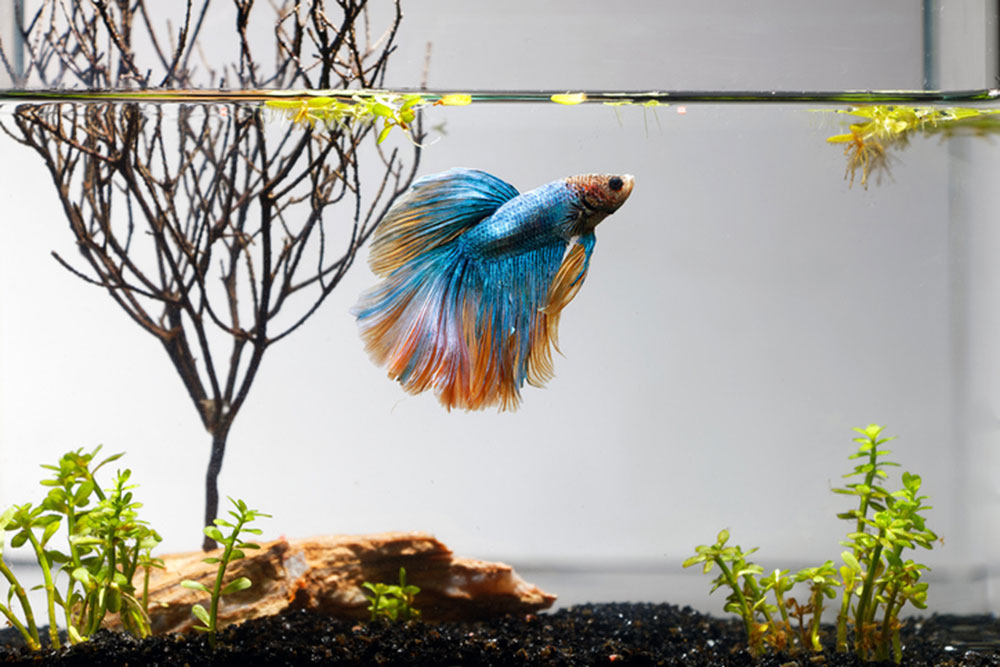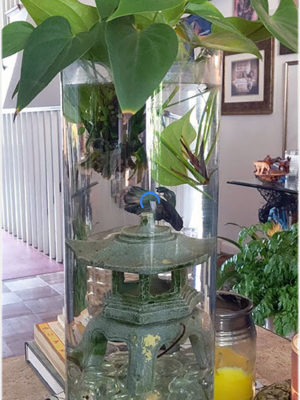
iStock
By Stephanie Cavanaugh
THERE’S A flutter of activity in the square glass vase beside the queso and chips on Chris Alvear’s coffee table. Flashing through a crumble of ornamental columns and the roots of a pink peace lily flowering high above the water’s surface is a beauty of a betta, a Japanese fighting fish, all black with a spectacular ruffle of red-orange fins. As if a tsunami hit a tropical shore, sundering a temple and leaving the ruins beneath a limpid sea.
A few inches away, a deep-blue betta shares a glass cylinder with a pagoda and what appears to be a pothos plant, tossing a mane of green over the lip of the vase. Another container holds a flashy red-and-black betta, which darts amid more traditional aquarium greenery.
“That’s Mr. Tie Dye,” says Chris. “The others are Mr. Big Red and Mr. Blue.” They’re males, which are much flashier than females, whose fins are smaller.
This is a setting made for flash. The mid-century row house Chris shares with his partner, Ward Orem, and their Chihuahua, Gigi, has been transformed into a circus of curiosities, with paintings covering nearly every inch of wall, some by Chris, a fine artist, others by others. Naked mannequins, and mannequin parts, are strung with beads. There are pillows and more pillows and throws and boxes and a strangely contented-looking deer head over the fireplace. Religious icons and elaborately dressed skeletons line the mantel, a memento mori to the Day of the Dead and Chris’s Southwestern heritage. French doors open to a terrace with a view of their exceptional garden * —and a glimpse of the Washington Channel.

Tucked in among the flora is the fauna. Okay, it’s a betta fish and a houseplant. / Photo by Stephanie Cavanaugh.
Then there are the fish. Their three vases are kept close together, so they can entertain one another, but separated because the fish might fight, which could either mean death or severely damaged plumes, which is kind of the whole point of having them.
Surprisingly, for such vicious little fishies, “they’re super friendly,” Chris says.
There are no heaters, no filters, none of the fancy accouterments associated with aquariums. Other than changing the (purified) water each month, for the plants as well as the fish, they’re fuss free. They eat their own droppings, he said, keeping the water clear. Ick, but okay.
“We’ve had our betta fish for over two years,” he says. “Amazing luck—other friends have them a few months and then it’s burial at sea ( the toilet). People tend to overfeed them. Don’t! Their stomachs are the size of their eyeballs so feeding them a pinch twice a week is best.
“We use a pellet food made by Aqueon, which has a formula that brings out the colors of the bettas. We also give them a treat of dried bloodworms.”
What a cheap thrill this can be, well, might be. Find a glass vase; there’s probably one under the sink or in a closet. Give it a few inches of glass pebbles. Pop in a plant and a fish and voilà!
Bettas can be had for as little as five bucks at pretty much any pet shop, or upwards of a thousand from a specialist. A Kachen Worachie sold at auction this past July for $1,500.
I would not start out with a thousand-dollar fish. Like a pound puppy, a five-dollar fish can be just as lovable, and the (inevitable) farewell above the commode a bit less tearful.
There is a host of plants that can grow quite nicely in water, and are not toxic to fish (though bettas don’t care for the taste of plants). Monstera, pothos, peace lily, spiderwort (wandering jew), and the twisted stems of lucky bamboo are all easy to grow in water. If they start to get stinky, change the water.
It’s also a nifty way to start new plants: Enjoy them on a tabletop now and move them to the garden next spring. For more about caring for these dazzling fish, check out A primer for betta care.
*When I last wrote about Chris Alvear, he was front-of-house manager of the Kennedy Center’s Roof Terrace Restaurant. He is now a senior manager at the BLT steak house in downtown DC. If your betta goes belly up, you can complain to him directly.
MyLittleBird often includes links to products we write about. Our editorial choices are made independently; nonetheless, a purchase made through such a link can sometimes result in MyLittleBird receiving a commission on the sale, whether through a retailer, an online store or Amazon.com.
